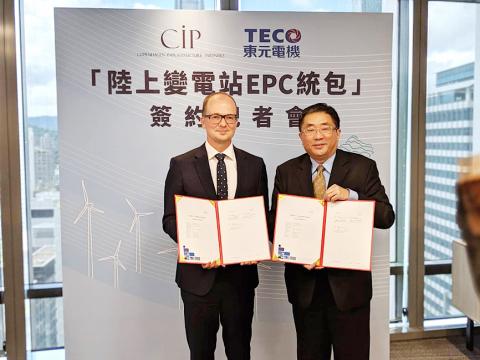Copenhagen Infrastructure Partners (CIP) yesterday signed a deal with Teco Electric and Machinery Co (東元電機) for its Chang Fang (彰芳) and Xidao (西島) projects off the coast of Changhua County, worth an estimated NT$2 billion (US$63.24 million).
Teco would be in charge of the engineering, procurement and construction of onshore substations for the two wind farms, which are to have a combined capacity of 600 megawatts (MW), of which 100MW would be provided by 2021 in the first phase of the projects and 500MW is scheduled for 2023.
Construction would start by the end of the year and is expected to be completed in 2021, Teco said.

Photo: Chen Ping-hung, Taipei Times
It said it would secure an estimated 98 percent of equipment and components locally, including switches, voltage transformers and regulators, and control panels.
“We already have the necessary techniques… We have previously installed substations for onshore wind turbines,” Teco acting president George Lien (連昭志) told reporters at the signing ceremony in CIP’s Taipei office.
Teco said it would operate the electrical substations through remote network monitoring.
Over the past few months, the Danish company has inked deals with CSBC-DEME Wind Engineering Co Ltd (台船環海), Dutch dredging and heavylift company Royal Boskalis Westminster NV and Hwa chi Construction Co (樺棋營造), a marine marine construction specialist, to show its willingness to comply with local content rules set by Taiwanese authorities.
“The Chang Fang and Xidao projects are three times more localized than other [wind farm] projects,” CIP Taiwan project office chief executive Jesper Krarup Holst said.
He hoped this would persuade local authorities to be more lenient regarding the use of certain equipment and components in the construction of wind farms, he added.
“Take [wind] turbines for example; the government requires the localization of 16 components,” he said.
Taiwan’s manufacturing industry lacks the needed technology, and another significant drawback is that the production of a few key components, such as power converters, is protected by patents, he said.
CIP also faces setbacks in steel structures for submarine foundations, which the firm has entrusted to Century Iron & Steel Industrial Co (世紀鋼構), as no local companies in downstream industries have delivered to an offshore wind farm before, Holst said, implying that the lack of experience would lead to deadlines being delayed and thus lower bankability.
Holst said CIP would push forward with localization content rules as it plans to unveil new deals in the next few months and the company’s dialogue with government officials is continuing.

WEAKER ACTIVITY: The sharpest deterioration was seen in the electronics and optical components sector, with the production index falling 13.2 points to 44.5 Taiwan’s manufacturing sector last month contracted for a second consecutive month, with the purchasing managers’ index (PMI) slipping to 48, reflecting ongoing caution over trade uncertainties, the Chung-Hua Institution for Economic Research (CIER, 中華經濟研究院) said yesterday. The decline reflects growing caution among companies amid uncertainty surrounding US tariffs, semiconductor duties and automotive import levies, and it is also likely linked to fading front-loading activity, CIER president Lien Hsien-ming (連賢明) said. “Some clients have started shifting orders to Southeast Asian countries where tariff regimes are already clear,” Lien told a news conference. Firms across the supply chain are also lowering stock levels to mitigate

Six Taiwanese companies, including contract chipmaker Taiwan Semiconductor Manufacturing Co (TSMC, 台積電), made the 2025 Fortune Global 500 list of the world’s largest firms by revenue. In a report published by New York-based Fortune magazine on Tuesday, Hon Hai Precision Industry Co (鴻海精密), also known as Foxconn Technology Group (富士康科技集團), ranked highest among Taiwanese firms, placing 28th with revenue of US$213.69 billion. Up 60 spots from last year, TSMC rose to No. 126 with US$90.16 billion in revenue, followed by Quanta Computer Inc (廣達) at 348th, Pegatron Corp (和碩) at 461st, CPC Corp, Taiwan (台灣中油) at 494th and Wistron Corp (緯創) at

NEW PRODUCTS: MediaTek plans to roll out new products this quarter, including a flagship mobile phone chip and a GB10 chip that it is codeveloping with Nvidia Corp MediaTek Inc (聯發科) yesterday projected that revenue this quarter would dip by 7 to 13 percent to between NT$130.1 billion and NT$140 billion (US$4.38 billion and US$4.71 billion), compared with NT$150.37 billion last quarter, which it attributed to subdued front-loading demand and unfavorable foreign exchange rates. The Hsinchu-based chip designer said that the forecast factored in the negative effects of an estimated 6 percent appreciation of the New Taiwan dollar against the greenback. “As some demand has been pulled into the first half of the year and resulted in a different quarterly pattern, we expect the third quarter revenue to decline sequentially,”

ASE Technology Holding Co (ASE, 日月光投控), the world’s biggest chip assembly and testing service provider, yesterday said it would boost equipment capital expenditure by up to 16 percent for this year to cope with strong customer demand for artificial intelligence (AI) applications. Aside from AI, a growing demand for semiconductors used in the automotive and industrial sectors is to drive ASE’s capacity next year, the Kaohsiung-based company said. “We do see the disparity between AI and other general sectors, and that pretty much aligns the scenario in the first half of this year,” ASE chief operating officer Tien Wu (吳田玉) told an